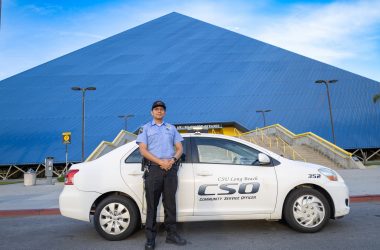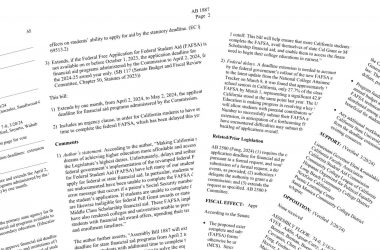The students in room 105 were taking notes last month on “the details that make a good story” when Detective Corporal Antonio Maciel entered the room and apologized for interrupting. After identifying himself and two other officials from the Cal State University Long Beach Investigations Bureau, Maciel entered the lecture hall and began his search.
Amelie Florence, a senior creative writing major, stopped taking notes on her Macbook Air as a uniformed officer and a man in plainclothes began sweeping the aisles carrying a yellow, handheld device. The device beeped with increasing frequency as the officers made their way up the stairs, but the frequency began to slow as they reached the top of the stairs. Many students appeared anxious, alert and perhaps a little confused as the machine helped the officers hone in on what they were looking for.
Florence thought perhaps they were looking for drugs as they continued their search, and she had no idea why they might be zeroing in on her. When they asked to see her laptop, she was confused.
“It wasn’t until they asked if it was mine that it dawned on me,” Florence said. “My first thought was just, whoa, they were actually, actively looking for it, awesome!” Her next thought was something that was shared by a lot of students in the room once it was obvious there was no dangerous threat: “Whoa, that’s pretty high tech stuff!”
In an effort to combat laptop and mobile device theft on campus, police have turned to advanced technology. The Beachnet+ wireless network provides a great way for students to connect to the internet for their studies, and now the campus Network Services staff is using it to assist police when devices are reported stolen. Lieutenant Richard Goodwin, Public Information Officer for CSULB, says IT personnel and police refer to the beeping locater as a “sniffer.”
“I refer to it as the ‘ghostbuster’ device,” Goodwin said, alluding to its visual similarity to the “Proton Packs” worn in the film Ghostbusters. The yellow, box-shaped device beeps as it approaches the signal being searched for. “It will zero in, because it has detected that IP address, and [we] can center right in on it,” Goodwin said.
Such devices are most effective when the laptop or mobile device is connected to the main network, in this case Beachnet+, according to Yvette Kay at Lookout, a company that designs phone and laptop locating apps. Attempts to reach Steve La, director of Network Services at CSULB who had originally agreed to be interviewed for this story, were unsuccessful. The sniffer is not the only way for police to track down devices that were reported as stolen, however.
Goodwin said campus police and IT professionals have numerous ways to locate devices, including Apple’s “Find my iPhone” service. “We’ve actually used that program and located phones that were stolen, and tracked them down and apprehended the individual that took the phone,” he said. “As soon as you log on, boom, that signals out. The IP address, which is attached to the computer or a phone, is basically a thumbprint.” Goodwin said such programs allow them to find devices on and off campus.
Campus police say there are six important details they want when someone reports a stolen device: an IP address, a serial number, the make, model and color of the device and any unique identifiers such as scratches, scuffs or stickers. Goodwin noted that only one of these details, the IP address, is actually a technological detail. The other five details, he said, help assist recover the stolen items using tactics that often prove most reliable – “good old police work.”
He referred to a case he worked on with fellow officers using a sniffer to zero in on an IP address. When the police team arrived at the general location of the stolen item, they found a hall outside a classroom crowded with students and staff. They were about to use the sniffer to hone in on the item when one officer said, “hang on, let me go in and ask around.” The officer then went into the classroom, asked a few questions and almost immediately located the student who had the device. In that instance, as is often the case according to Goodwin, the student was not the thief, but had purchased it from a thief who had sold it through Craigslist.
Florence reported her laptop stolen on Sept. 4, only to find out a fellow classmate had grabbed it for her after she left it in a class. She forgot to notify campus police after it was returned to her, so they continued looking for it until they found her with it in a literature class five days later.



